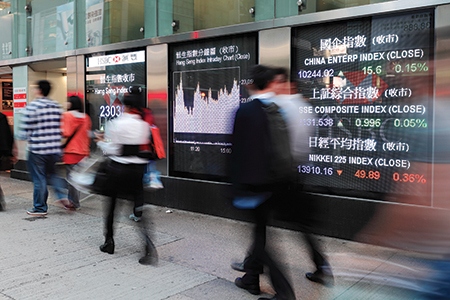 The news has been grim. Headline after headline has shown panic setting in across the Pacific Ocean as China reels from a massive crash in its young and volatile stock market. At its worst period, the Shanghai Composite Index plunged a stunning 30 percent in three weeks—the equivalent of the Dow Jones Industrial Average dropping 5,400 points.
The news has been grim. Headline after headline has shown panic setting in across the Pacific Ocean as China reels from a massive crash in its young and volatile stock market. At its worst period, the Shanghai Composite Index plunged a stunning 30 percent in three weeks—the equivalent of the Dow Jones Industrial Average dropping 5,400 points.
This economic implosion is particularly alarming for real estate brokers on the West Coast or in any city that has been riding a wave of Chinese investment during the recovery of the U.S. housing market.
Credit Suisse issued a statement suggesting that the Chinese stock crash could lead to a new subprime lending crisis due to the fact that so many Chinese stock investors were borrowing money—presumably by refinancing their homes—to buy Chinese stocks on margin. Bank of America/Merrill Lynch agreed that a new financial crisis could be brewing in the Far East.
John Wong, managing broker of Better Homes and Gardens Real Estate Mason-McDuffie in San Francisco, does not see this Chinese stock correction playing out that extremely, though he says it might slow down the flood of Chinese money into the U.S., at least temporarily. He has been selling homes in the Bay area to Chinese nationals and Chinese-Americans for 33 years. In the past five years, these buyers have grown to be about 65 percent of his business.
“I’m deep in it,” Wong says. “I’m like, ‘Oh my God, what is this going to do for the U.S. market?’ But as I follow it deeper and deeper, I realize it’s very alarmist in the headlines. The folks who have driven (the Shanghai Composite Index) up are not the folks who’ve bought American real estate.”
About 90 million Chinese people are considered regular “retail” investors in their stock market, and many of them are taking the brunt of this summer’s blow. It’s sad that so many have lost so much—and so quickly—but the broader view isn’t that scary from a macroeconomic level, Wong says. Before the recent crash, the Shanghi Composite had doubled in about a year, so most of the early retail investors would still be cash positive or even.
The main issue to pay attention to, Wong says, is how the Chinese government will react to this increased volatility. Wong is also watching Chinese development groups such as Greenland, which has been investing billions of dollars in American cities like the resurging downtown of Los Angeles and Manhattan’s Atlantic Yards, to see if they pull the plug on their projects.
In the meantime, though, the prevailing motivator could likely be a bullish investment thesis of U.S. real estate. “It makes buying real estate outside of China even more attractive,” says Wong.
Seattle and Vancouver have been hot markets for the Chinese, and brokers there don’t see that trend letting up anytime soon either.
“The Seattle area has had a big increase in Chinese nationals buying homes in the past few years, particularly on the Eastside. A large portion of those sales have been in the high-end luxury market, and far more transactions have been all-cash than in the past,” explains Sam DeBord, managing broker of Seattle Homes Group, Coldwell Banker Danforth.
He acknowledges that some of those who have moved to Seattle from China in the past five years could have been caught up in the stock market action of their homeland, and now they might be squeezed financially, putting their properties at risk. However, the broader market of the city is unlikely to be affected, says DeBord.
Asked about Chinese-Americans losing their savings in the crash and being forced to sell their Seattle homes, DeBord admits, “that’s possible, but the most common story we hear is people buying homes in good school districts so that they can send their children here and move permanently, eventually. We’ve had clients who didn’t even have children yet send the future grandparents over to find the future family home. If they’ve already purchased, they’re seeing value appreciation here and it’s another good reason to stay.”
The lesson here is that all investments are relative to everything else. In a global economy, when one asset class falls out of favor, the others look that much better. In this case, an unstable Chinese stock market could reroute those investors to American real estate.
“Although American real estate has ups and downs, it’s still seen as a far more stable asset than many others. Tie that to the stability of the dollar, and international turmoil points to more investment here—for those who didn’t lose their assets internationally already,” DeBord says. “The Chinese buyers who are purchasing vacation homes may slow down as their assets shrink, but those who are looking for a new life and a stable place to live will probably keep coming.”
The new challenge for brokers is to make sure these buyers are financially sound and haven’t been hurt too badly from the market turmoil back home, DeBord adds. There could be a lot of vulnerabilities hidden in the wealth of a Chinese buyer if they’re either invested heavily in the Shanghai Composite Index and/or leveraged with their mortgage back home.
“Brokers need to do their due diligence with buyers and make sure they’re fully educated on the risk and transactional costs,” advises DeBord. “Get proof of funds from buyers upfront, and explain to them that they must be in a liquid savings account, not a security or anything with potential of quick losses. By having foreign buyers prepared to present themselves as not only willing buyers, but financially and legally prepared buyers, brokers can close more transactions.”
Andrew King is an award-winning journalist with 15 years of experience with the Gannett newspaper company, appearing in The Journal News (Westchester, NY), Asbury Park Press and USA Today. He also contributes to The Real Deal, TheLadders.com and TechPageOne.com.










